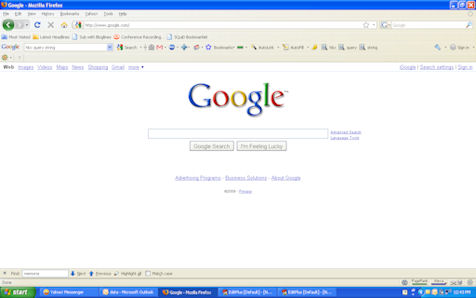One of the fascinating trends of the 21st century (more or less) is the fact that “less is more”. This saying has been around for a long time, but this decade has brought it to new heights. In our industry, there are two stunning examples. One of the best examples is Google:
 |
A quick spot check shows that Google currently has a market cap of $163 Billion. As we all know, a lot of technology goes into allowing Google to provide such a simple interface, and also to put them in the market leading position they occupy. But, for the user, one of the major advantages of the service is simplicity. Another great example is Twitter:
 |
Where else can you find a company without a revenue model that is valued at one billion dollars? Here the nature of how less is offered is a bit different. The limitation is that you can only enter 140 characters. This limit seems to drive people to participate because they can dash off a quick note really easily. Of course, the real-time nature of the platform is important as well, but the “limitation” to 140 characters is actually a feature. I would assert that if the box allowed you to enter 400 characters that usage would drop quickly.
People want simple. There is too much complexity in the modern world. Information and advertising is coming at us from everywhere, and there is no reason to believe it will slow down. This also causes us to want to lean on personal recommendations from others more. Talking to someone who already has the product and seeing how they liked it is another defense mechanism, but that is not the subject of this post.
In the case of Google and Twitter, the utter simplicity of the products is a big key to their success. Just let me do what I want, do it quickly, and don’t flood me lots of other stuff I don’t care about. Key to this is that the functions served are in high enough demand. For Google, people just want to be able to search the web. They don’t want Google to provide content, just lists of web sites. With Twitter, I don’t want to write a book, or even a blog post, I just want to have real-time connectivity with my friends/associates where all I need to do is send off quick notes.
A third example worth mentioning is texting. Many teenagers simply don’t bother with email, or even using phones to make calls. Too many features. Texting is sufficient, even on those phones where I have only a numeric keypad. Besides, this way I can use the same small device to communicate at home, the office, or while on the road.
Of course, less is not always better. There are times when the additional features are desirable. So when is less more? If a large number of people would say this about an activity: “I simply want to do __________ without any hassle”, you have an opportunity for less to be big. Will this trend continue? Our world’s complexity is not going down (it is increasing). The conclusion?
You can expect to see a lot more, or less, in the future.
